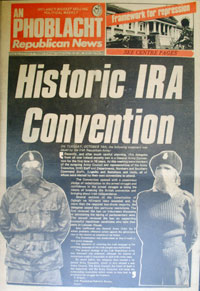12 October 2006 Edition
Remembering the Past

IRA backs taking of seats
On Thursday 16 October 1986 An article in An Phoblacht confirmed that sometime in the previous weeks the Irish Republican Army had held a meeting of the General Army Convention, the organisation's supreme decision-making body - the first gathering of the GAC in 16 years. Several sections of the Constitution of Óglaigh na hÉireann were amended, and by more than the required two-thirds majority, the delegates passed two particularly notable resolutions. The first removed the ban on IRA Volunteers discussing or advocating the taking of parliamentary seats. The second removed the ban on supporting successful republican candidates who would take their seats in Leinster House.
At the same Convention the IRA Constitution was modernised to read in non-sexist language. Delegates elected a 12-person Army Executive, which in turn elected a new Army Council. Details of the Convention were supplied to An Phoblacht stating;
"The Convention was of major historic proportions in terms of the development of the republican struggle. For the first time in 16 years an IRA leadership was elected by delegates. The organisation renewed its mandate for the armed overthrow of British rule in Ireland and debated and adopted further strategies to defend and consolidate the struggle for a democratic, socialist republic."
The decisions made at the 1986 IRA Convention were the result of the continued evolution in strategy within republicanism in the years following the 1981 Hunger Strike and the successful elections of IRA Volunteers Bobby Sands, Kieran Doherty and Paddy Agnew and demonstrated the potential of harnessing and maximising support for a United Ireland. The Convention was also the precursor to an equally historic Sinn Féin Ard Fheis later that same month.
While Sinn Féin would decide its own strategy in relation to the issue of abstention from Leinster House, it was clear from the IRA decision which way many republicans were thinking. In a keynote editorial An Phoblacht implicitly urged Sinn Féin delegates to advance the struggle by dropping abstentionism:
"For too long succesive 26-County governments have impeded peace and progress, and have censored republicans, without effectively being challenged."
"To win the struggle the Republican Movement needs to counter falsehoods, needs to increase support, needs to be relevant and to be effective- and to be effective it needs to be free of constraints.
"Out of the IRA's General Army Convention has emerged a healthier, committed army, confident of seeing the long, hard war through to a victorious conclusion.
"Let us borrow some of their boldness and confidence."
Two weeks later Sinn Féin delegates at its annual Ard Fheis voted to end the party's policy of abstention from Leinster House.
The IRA publicly welcomed the Sinn Féin decision and also took the opportunity to respond to certain republican critics who, using archaic and legalistic arguments based around an outdated theology surrounding the long-redundant Second Dáil - arguments which meant nothing to the vast majority of Irish people:
"To suggest that the IRA is not legitimate because of the decision it has taken on abstentionsim is ridiculous. The IRA predates the Second Dáil and the First Dáil, its constitution is a military constitution, and our legitimacy stems from organised popular resistance to British rule in Ireland, a tradition which was reinforced in 1916, by the Fenians, by the Young Irelanders, by the United Irishmen. Its legitimacy stems from a tradition of resistance which has been a fact of history since Britain first encroached on Irish sovereignty 800 years ago."
The public statement announcing that an IRA General Army Convention had taken place and removed the ban on Volunteers supporting republicans taking seats in Leinster House, was issued on Tuesday, 14 October 1986, 20 years ago this week.


